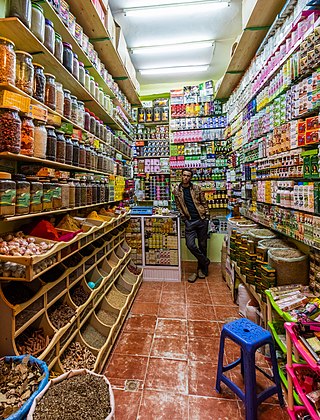E-commerce is the activity of electronically buying or selling of products on online services or over the Internet. E-commerce draws on technologies such as mobile commerce, electronic funds transfer, supply chain management, Internet marketing, online transaction processing, electronic data interchange (EDI), inventory management systems, and automated data collection systems. E-commerce is in turn driven by the technological advances of the semiconductor industry, and is the largest sector of the electronics industry.

A loyalty program is a marketing strategy designed to encourage customers to continue to shop at or use the services of a business associated with the program. A loyalty program typically involves the operator of a particular program set up an account for a customer of a business associated with the scheme, and then issue to the customer a loyalty card which may be a plastic or paper card, visually similar to a credit card, that identifies the cardholder as a participant in the program. Cards may have a barcode or magstripe to more easily allow for scanning, although some are chip cards or proximity cards.

Shopping is an activity in which a customer browses the available goods or services presented by one or more retailers with the potential intent to purchase a suitable selection of them. A typology of shopper types has been developed by scholars which identifies one group of shoppers as recreational shoppers, that is, those who enjoy shopping and view it as a leisure activity.

Retail is the sale of goods and services to consumers, in contrast to wholesaling, which is sale to business or institutional customers. A retailer purchases goods in large quantities from manufacturers, directly or through a wholesaler, and then sells in smaller quantities to consumers for a profit. Retailers are the final link in the supply chain from producers to consumers.

Distribution is the process of making a product or service available for the consumer or business user who needs it, and a distributor is a business involved in the distribution stage of the value chain. Distribution can be done directly by the producer or service provider, or using indirect channels with distributors or intermediaries. Distribution is one of the four elements of the marketing mix: the other three elements being product, pricing, and promotion.
Sales promotion is one of the elements of the promotional mix. The primary elements in the promotional mix are advertising, personal selling, direct marketing and publicity/public relations. Sales promotion uses both media and non-media marketing communications for a pre-determined, limited time to increase consumer demand, stimulate market demand or improve product availability. Examples include contests, coupons, freebies, loss leaders, point of purchase displays, premiums, prizes, product samples, and rebates.

Rakuten Group, Inc. is a Japanese technology conglomerate based in Tokyo, founded by Hiroshi Mikitani in 1997. Centered around the online retail marketplace Rakuten Ichiba, its businesses include financial services utilizing fintech, digital content and communications services such as the messaging app Viber, e-book distributor Kobo, and Japan's fourth mobile carrier Rakuten Mobile. Rakuten has more than 28,000 employees worldwide, operating in 30 countries and regions, and its revenues totalling US $12.8 billion as of 2021. Rakuten was the official sponsor of the Spanish football club FC Barcelona from 2017 until 2021, and the Golden State Warriors of the NBA as of 2022. It is often referred to as the "Amazon of Japan".

Online shopping is a form of electronic commerce which allows consumers to directly buy goods or services from a seller over the Internet using a web browser or a mobile app. Consumers find a product of interest by visiting the website of the retailer directly or by searching among alternative vendors using a shopping search engine, which displays the same product's availability and pricing at different e-retailers. As of 2020, customers can shop online using a range of different computers and devices, including desktop computers, laptops, tablet computers and smartphones.
Online shopping rewards are a type of loyalty program to e-commerce shoppers.
The term mobile commerce was originally coined in 1997 by Kevin Duffey at the launch of the Global Mobile Commerce Forum, to mean "the delivery of electronic commerce capabilities directly into the consumer’s hand, anywhere, via wireless technology." Many choose to think of Mobile Commerce as meaning "a retail outlet in your customer’s pocket."
Social shopping is a method of e-commerce where shoppers' friends become involved in the shopping experience. Social shopping attempts to use technology to mimic the social interactions found in physical malls and stores. With the rise of mobile devices, social shopping is now extending beyond the online world and into the offline world of shopping.

eBay Enterprise, Inc. was a multinational e-commerce corporation that specialized in creating, developing and running online shopping sites for brick and mortar brands and retailers. The company also provided a variety of marketing, consumer engagement, customer care, payment processing, fulfillment, fraud detection, and technology integration services.

Groupon is an American global e-commerce marketplace connecting subscribers with local merchants by offering activities, travel, goods and services in 13 countries. Based in Chicago, Groupon was launched there in November 2008, launching soon after in Boston, New York City and Toronto. By October 2010, Groupon was available in 150 cities in North America and 100 cities in Europe, Asia and South America, and had 35 million registered users. By the end of March 2015, Groupon served more than 500 cities worldwide, nearly 48.1 million active customers and featured more than 425,000 active deals globally in 48 countries.
Webloyalty is an online marketing company, part of Affinion Group, that runs reward programmes 'Shopper Discounts & Rewards' and 'Complete Savings'. These programmes require a monthly subscription in return for access to discounts similar to those on a cashback website. Previously, Webloyalty's marketing practices have attracted significant controversy and substantial lawsuits.
Tmall, formerly Taobao Mall, is a Chinese-language website for business-to-consumer (B2C) online retail, spun off from Taobao, operated in China by Alibaba Group. It is a platform for local Chinese and international businesses to sell brand-name goods to consumers in Greater China. It has over 500 million monthly active users, as of February 2018. In the last few years, it has opened its features to brands, not only for online sales but also for developing brand awareness. According to Alexa Rank, it is the third most visited website globally in 2021.
Rakuten Rewards, formerly known as Ebates, is a cash-back and shopping rewards company. Its revenue comes from affiliate network links. Members of the site click through affiliate links before shopping at a retailer's site. Once the member makes a purchase, Rakuten Rewards receives an affiliate commission from the retailer which is then shared with the member. The company publishes links both on its website and through a browser extension as well as a mobile app.

Vipshop is a Chinese company that operates the e-commerce website VIP.com specializing in online discount sales. Vipshop is based out of Guangzhou, Guangdong, China, and was listed on New York Stock Exchange (NYSE) on March 23, 2012. As of 2017, Vipshop had 52.1 million customers, and there were 269.8 million orders for the year 2016. Following Tmall and JD.com, it is now the third largest e-commerce site in China.
SK Planet Co., Ltd., a subsidiary of SK Telecom, was established in 2011 and is an internet platform development company located in Pangyo, South Korea’s silicon valley with operations in 8 countries. SK Planet was spun off from SK Telecom to focus on online services and has since evolved to focus on three core business services: e-Commerce, Online-to-Offline services, and digital marketing.
The retail format influences the consumer's store choice and addresses the consumer's expectations. At its most basic level, a retail format is a simple marketplace, that is; a location where goods and services are exchanged. In some parts of the world, the retail sector is still dominated by small family-run stores, but large retail chains are increasingly dominating the sector, because they can exert considerable buying power and pass on the savings in the form of lower prices. Many of these large retail chains also produce their own private labels which compete alongside manufacturer brands. Considerable consolidation of retail stores has changed the retail landscape, transferring power away from wholesalers and into the hands of the large retail chains.

Strandbags is an Australian and New Zealand retailer of handbags, wallets, luggage, backpacks and other personal accessories.









